Abstract
Candida albicans GDH 2346 produces extracellular polymeric material (EP) which contains a mannoprotein adhesin with a lectin-like affinity for fucose-containing glycosides. EP isolated from culture supernatants of this strain was used as starting material for purification of the adhesin. The purification protocol involved a stepwise treatment of EP with N-glycanase, papain, and dilute alkali to cleave the protein and carbohydrate portions of the mannoprotein molecule. Fucoside-binding protein fragments were then recovered by affinity adsorption with the trisaccharide determinant of the H (type 2) blood group antigen which terminates in a residue of L-fucose. The purified adhesin was devoid of carbohydrate and inhibited yeast adhesion to buccal epithelial cells 221 times more efficiently, on a protein weight basis, than did EP. Adhesion inhibition reached a maximum of 78 to 80% at an adhesin concentration of 10 micrograms ml-1. Our results indicate that this protein is the major adhesin of yeast-phase cells of C. albicans GDH 2346 but that one or more secondary adhesion mechanisms may operate.
Full text
PDF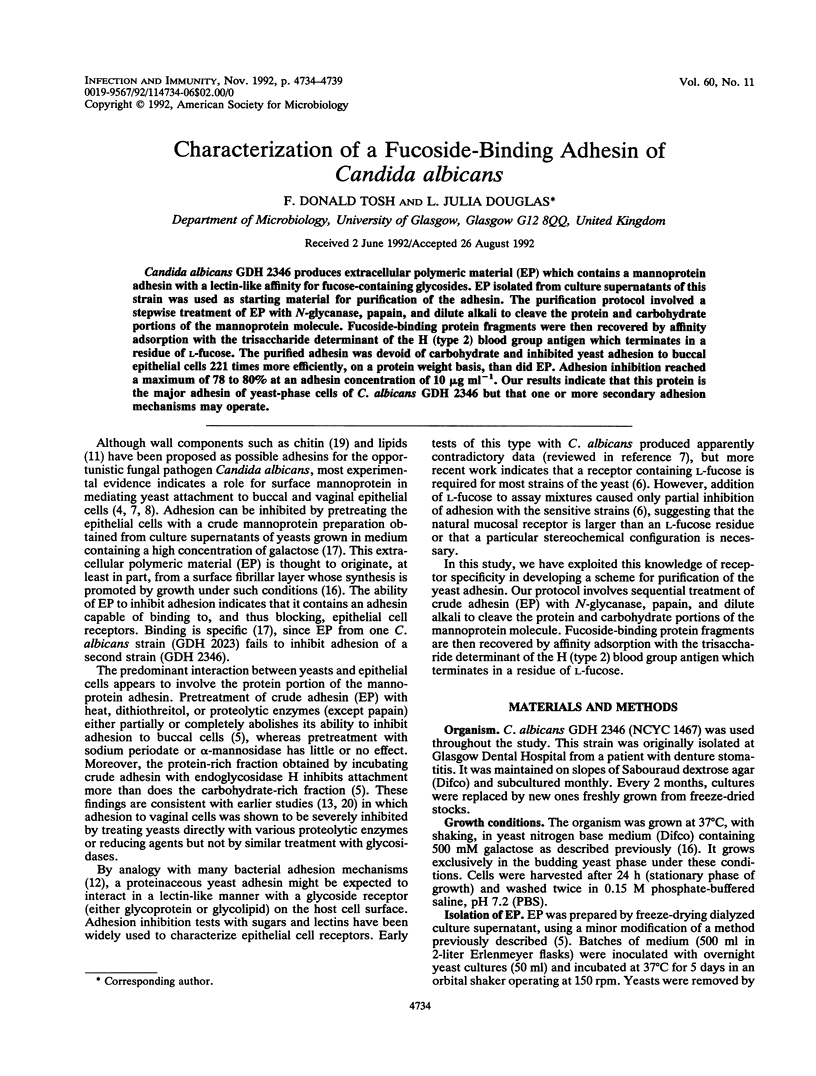
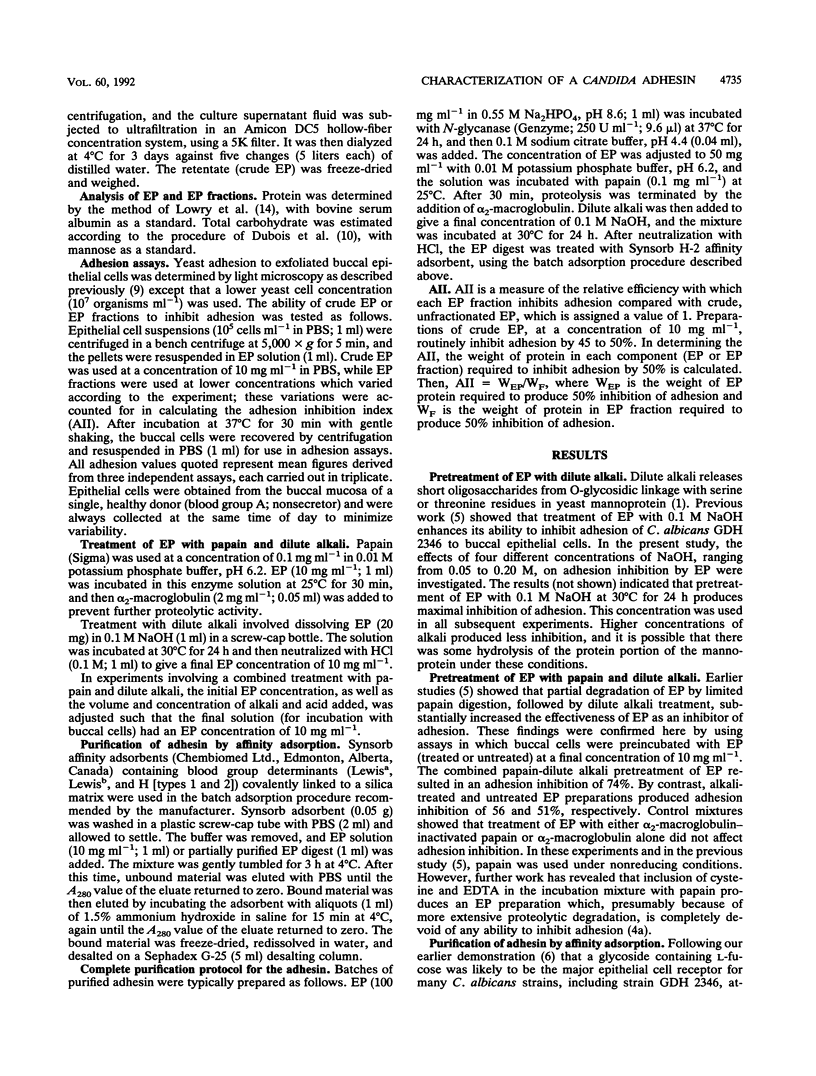
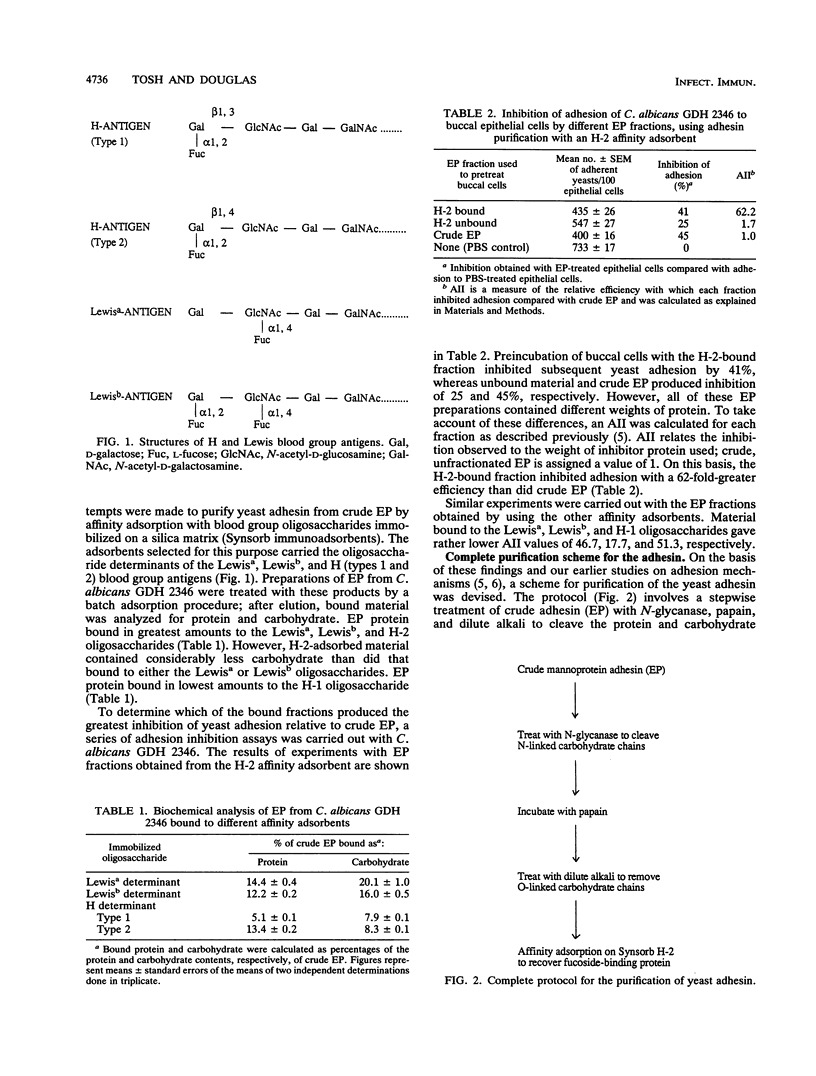
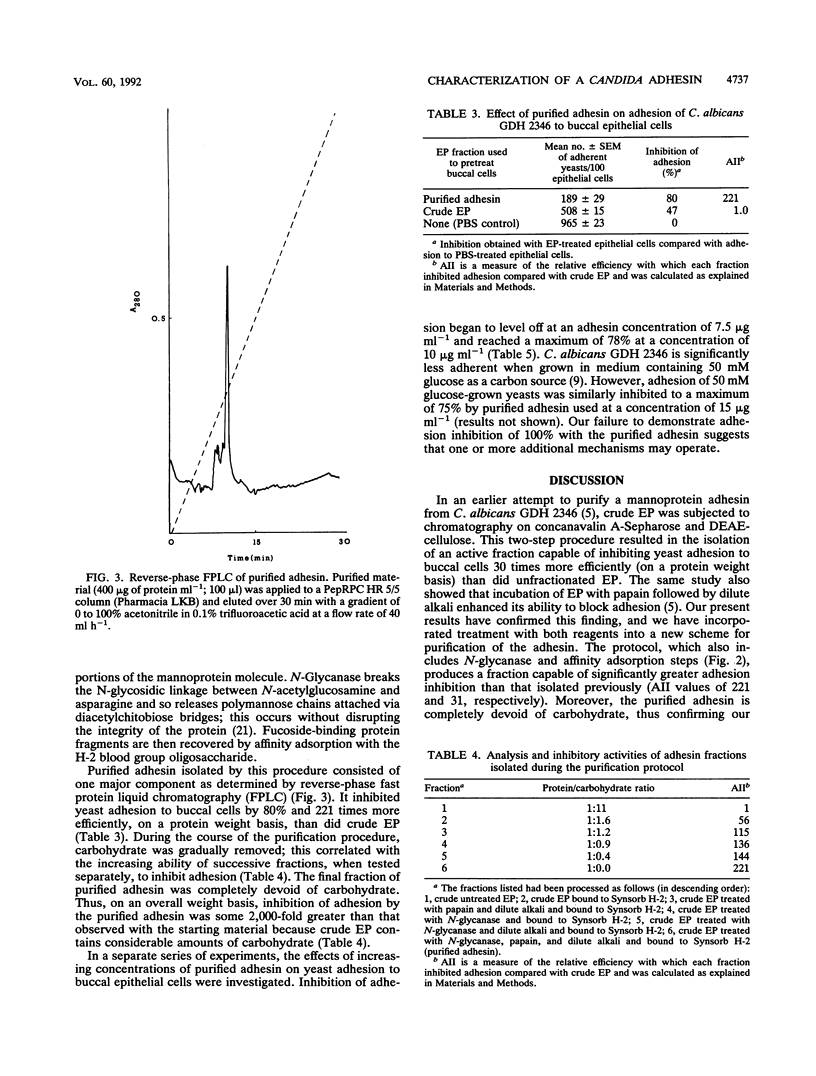
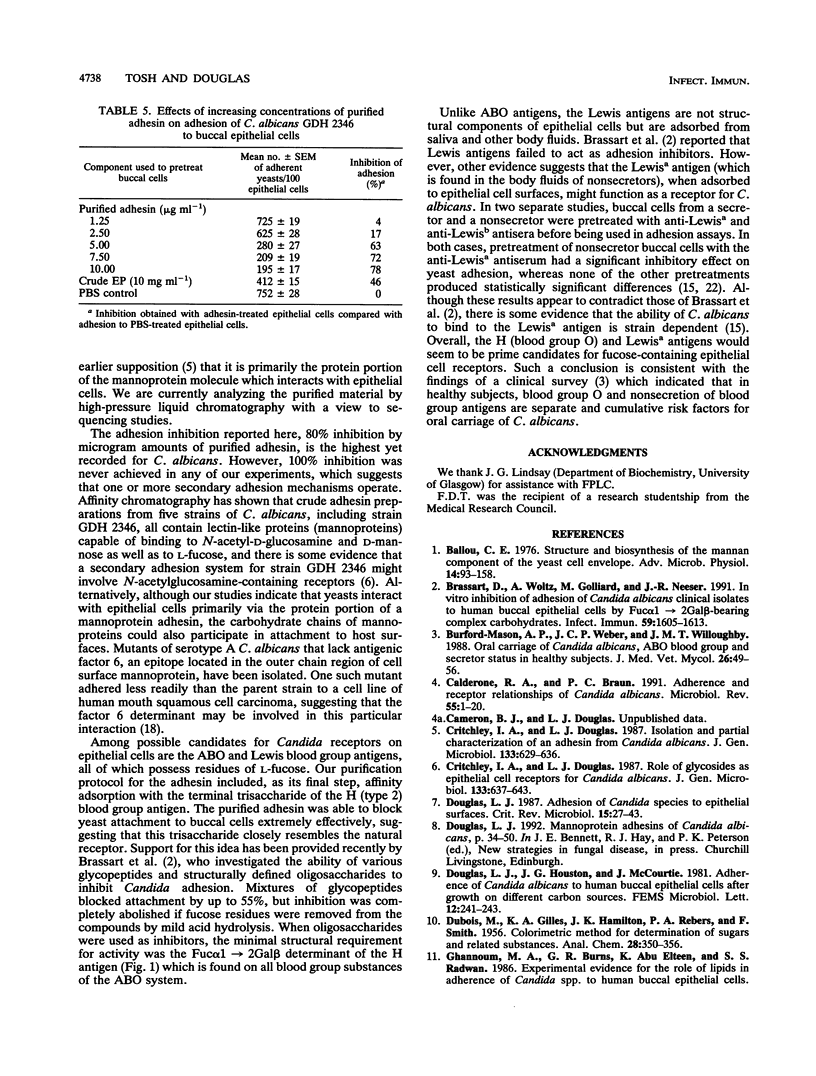
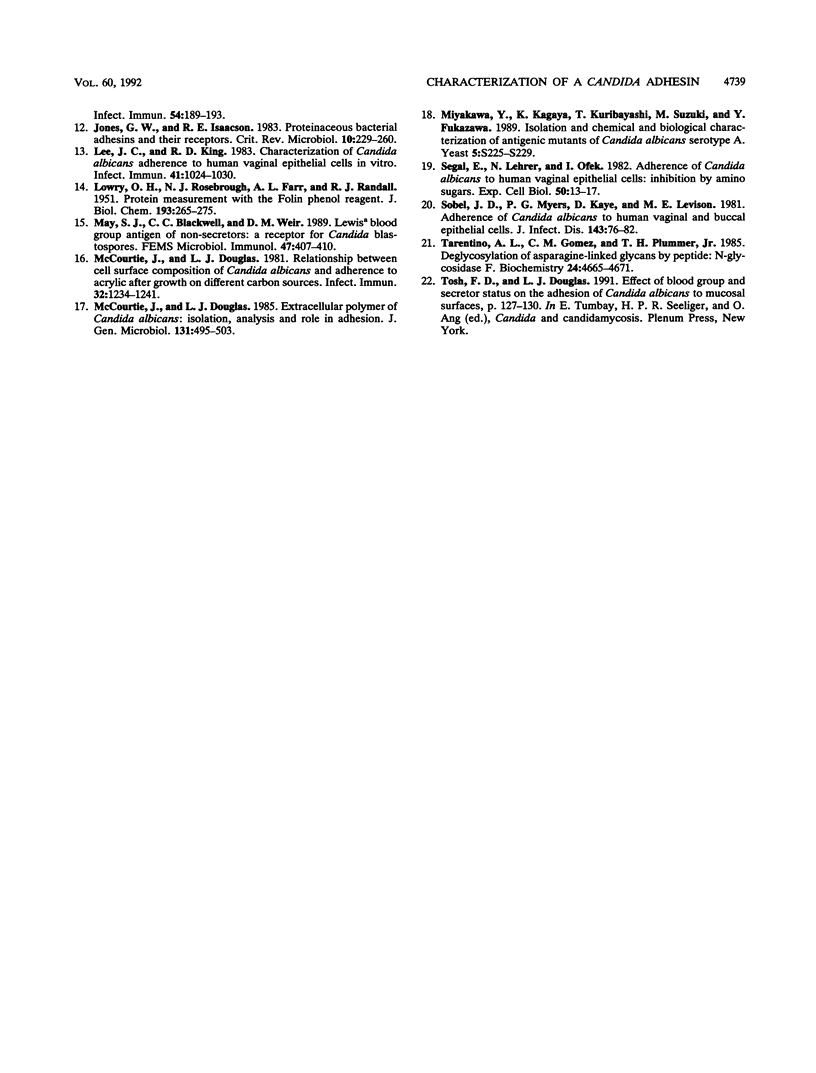
Selected References
These references are in PubMed. This may not be the complete list of references from this article.
- Ballou C. Structure and biosynthesis of the mannan component of the yeast cell envelope. Adv Microb Physiol. 1976;14(11):93–158. doi: 10.1016/s0065-2911(08)60227-1. [DOI] [PubMed] [Google Scholar]
- Brassart D., Woltz A., Golliard M., Neeser J. R. In vitro inhibition of adhesion of Candida albicans clinical isolates to human buccal epithelial cells by Fuc alpha 1----2Gal beta-bearing complex carbohydrates. Infect Immun. 1991 May;59(5):1605–1613. doi: 10.1128/iai.59.5.1605-1613.1991. [DOI] [PMC free article] [PubMed] [Google Scholar]
- Burford-Mason A. P., Weber J. C., Willoughby J. M. Oral carriage of Candida albicans, ABO blood group and secretor status in healthy subjects. J Med Vet Mycol. 1988 Feb;26(1):49–56. doi: 10.1080/02681218880000061. [DOI] [PubMed] [Google Scholar]
- Calderone R. A., Braun P. C. Adherence and receptor relationships of Candida albicans. Microbiol Rev. 1991 Mar;55(1):1–20. doi: 10.1128/mr.55.1.1-20.1991. [DOI] [PMC free article] [PubMed] [Google Scholar]
- Critchley I. A., Douglas L. J. Isolation and partial characterization of an adhesin from Candida albicans. J Gen Microbiol. 1987 Mar;133(3):629–636. doi: 10.1099/00221287-133-3-629. [DOI] [PubMed] [Google Scholar]
- Critchley I. A., Douglas L. J. Role of glycosides as epithelial cell receptors for Candida albicans. J Gen Microbiol. 1987 Mar;133(3):637–643. doi: 10.1099/00221287-133-3-637. [DOI] [PubMed] [Google Scholar]
- Douglas L. J. Adhesion of Candida species to epithelial surfaces. Crit Rev Microbiol. 1987;15(1):27–43. doi: 10.3109/10408418709104446. [DOI] [PubMed] [Google Scholar]
- Jones G. W., Isaacson R. E. Proteinaceous bacterial adhesins and their receptors. Crit Rev Microbiol. 1983;10(3):229–260. doi: 10.3109/10408418209113564. [DOI] [PubMed] [Google Scholar]
- LOWRY O. H., ROSEBROUGH N. J., FARR A. L., RANDALL R. J. Protein measurement with the Folin phenol reagent. J Biol Chem. 1951 Nov;193(1):265–275. [PubMed] [Google Scholar]
- Lee J. C., King R. D. Characterization of Candida albicans adherence to human vaginal epithelial cells in vitro. Infect Immun. 1983 Sep;41(3):1024–1030. doi: 10.1128/iai.41.3.1024-1030.1983. [DOI] [PMC free article] [PubMed] [Google Scholar]
- May S. J., Blackwell C. C., Weir D. M. Lewis a blood group antigen of non-secretors: a receptor for candida blastospores. FEMS Microbiol Immunol. 1989 Jun;1(6-7):407–409. doi: 10.1111/j.1574-6968.1989.tb02429.x. [DOI] [PubMed] [Google Scholar]
- McCourtie J., Douglas L. J. Extracellular polymer of Candida albicans: isolation, analysis and role in adhesion. J Gen Microbiol. 1985 Mar;131(3):495–503. doi: 10.1099/00221287-131-3-495. [DOI] [PubMed] [Google Scholar]
- McCourtie J., Douglas L. J. Relationship between cell surface composition of Candida albicans and adherence to acrylic after growth on different carbon sources. Infect Immun. 1981 Jun;32(3):1234–1241. doi: 10.1128/iai.32.3.1234-1241.1981. [DOI] [PMC free article] [PubMed] [Google Scholar]
- Miyakawa Y., Kagaya K., Kuribayashi T., Suzuki M., Fukazawa Y. Isolation and chemical and biological characterization of antigenic mutants of Candida albicans serotype A. Yeast. 1989 Apr;5(Spec No):S225–S229. [PubMed] [Google Scholar]
- Segal E., Lehrer N., Ofek I. Adherence of Candida albicans to human vaginal epithelial cells: inhibition by amino sugars. Exp Cell Biol. 1982;50(1):13–17. doi: 10.1159/000163121. [DOI] [PubMed] [Google Scholar]
- Sobel J. D., Myers P. G., Kaye D., Levison M. E. Adherence of Candida albicans to human vaginal and buccal epithelial cells. J Infect Dis. 1981 Jan;143(1):76–82. doi: 10.1093/infdis/143.1.76. [DOI] [PubMed] [Google Scholar]
- Tarentino A. L., Gómez C. M., Plummer T. H., Jr Deglycosylation of asparagine-linked glycans by peptide:N-glycosidase F. Biochemistry. 1985 Aug 13;24(17):4665–4671. doi: 10.1021/bi00338a028. [DOI] [PubMed] [Google Scholar]


